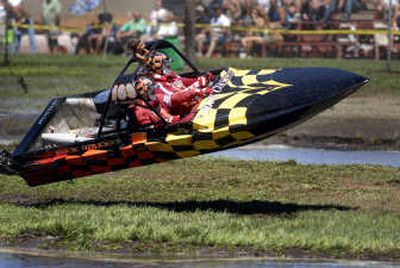Boat race a winner for St. John

Even seven months ago, few thought St. John would have its largest traffic jam this summer, let alone a mud-slinging sprint boat race that would draw world champions and quadruple the size of the town.
On Saturday, it happened.
This small wheat-farming town on the Palouse put its name on the map when it hosted its first jet sprint boat race this weekend, boasting a slender course that posed challenges to even the most experienced boat racers.
“This is a track that separates men from boys,” said world sprint boat race champion and Tri Cities resident Tom Nelson, 35, who won the race. The tight turns and narrow lanes threw several of the 25 boats off course and caused resounding cheers from a crowd of about 3,500 people, many of whom had never seen this kind of event before.
“All small towns need a little kick,” said St. John resident Al Roberts, 64, especially his town, population 520 since 1952. “The whole world is here,” he chuckled, declaring a newfound desire to take one of the multicolored boats with names like Piranha and Tsunami Racing down the St. Joe River.
Sprint boat racing was even new for organizer Amanda Webb, 28, who roped family and friends into helping out with the event. She and her husband, Matt, own the alfalfa-producing land and only decided to build the course this past February when Colfax driver Scott Ackerman and the United States Sprint Boat Association expressed interest in it. The organization had considered Rosalia and Cheney, but Webb said the slough on her property offered more space, and the community was supportive enough to make it happen.
“Which is a huge factor,” she said. “What we saw was the opportunity for our community to really thrive because of this and take advantage of an event like this.”
And that’s exactly what they are doing, said St. John resident and schoolteacher Becky Gonzalez, 48, who said she didn’t recognize any spectators on the terraced fields because everyone from the town was assisting with the event.
“People really welcomed this,” she said, turning to watch local favorite Don Smith shoot a wave of water into the crowd as his boat leapt to about 80 miles per hour in seconds. The fastest racers complete the course in less than 40 seconds. Racers have four chances to make the qualifying round where the top eight boats race again.
Organizer Matt Webb, 34, said the amount of accumulated revenue mattered little compared to the morale boost it gave the town, but bar owner Ward Pierce, 56, said he made twice his normal amount as the boats paraded downtown for the pre-show on Friday night.
Even Ackerman, 38, who won the national competition last year and helped mastermind the event, said he was “blown away” by all the spectators. “I said it wasn’t big enough to draw a crowd,” Ackerman said, shaking his head at the memory and looking out at the wave of fans sitting on the grassy hills. “It’s bigger than any other,” he said, referring to the three other race sites in Washington, Idaho and Oregon.
Oakesdale resident Derek Chaple, 24, stood at the beer garden on the other side of the course and appeared just as amazed as Ackerman. “Everyone is really excited because we are way out in the middle of nowhere and there are thousands of people here,” he said.
A bit less relaxed but equally enthusiastic, Webb family friend Steve Smith, 36, talked into an earpiece as he waved waiting speed boats towards the water. “I have no idea what I am doing,” said the farmer from St. John with a chuckle. “I never heard about this event until three weeks ago, but it looks like fun. It’s a real local curiosity.”
The location is not only visually appealing with the wheat fields and terraces providing a natural amphitheater, but the environmental effects are minimal, said Amanda Webb. “What we have done can easily be filled back in the day after the race and nobody would know,” she said.